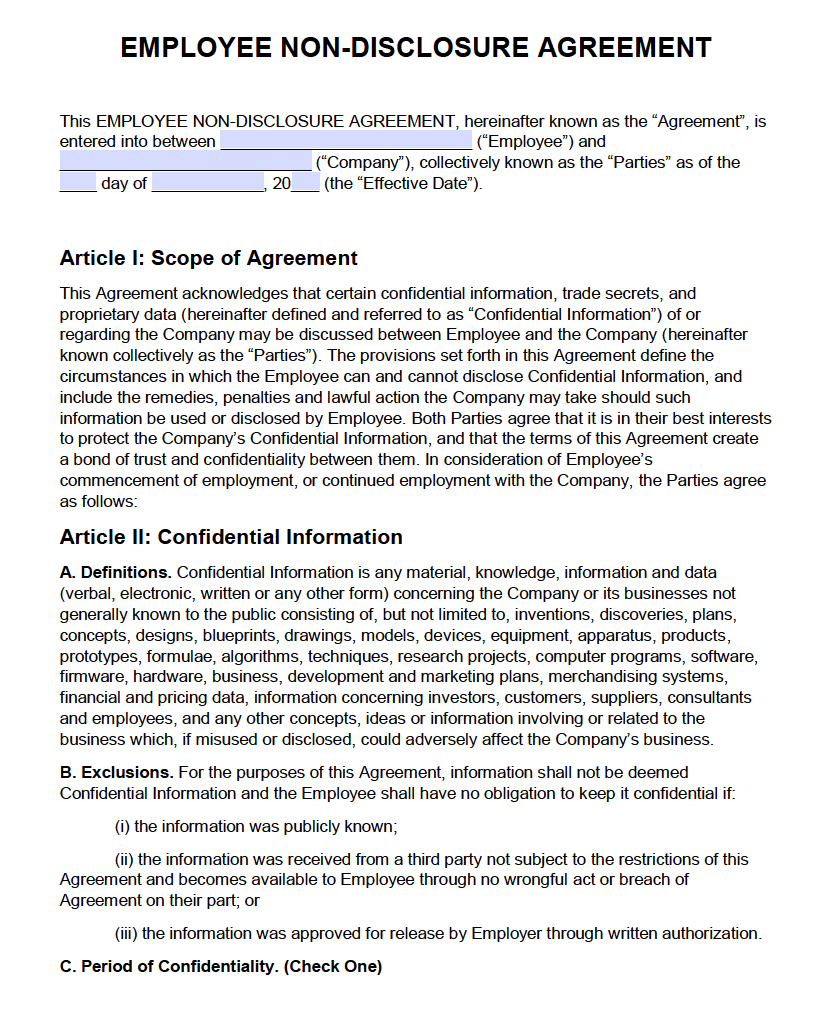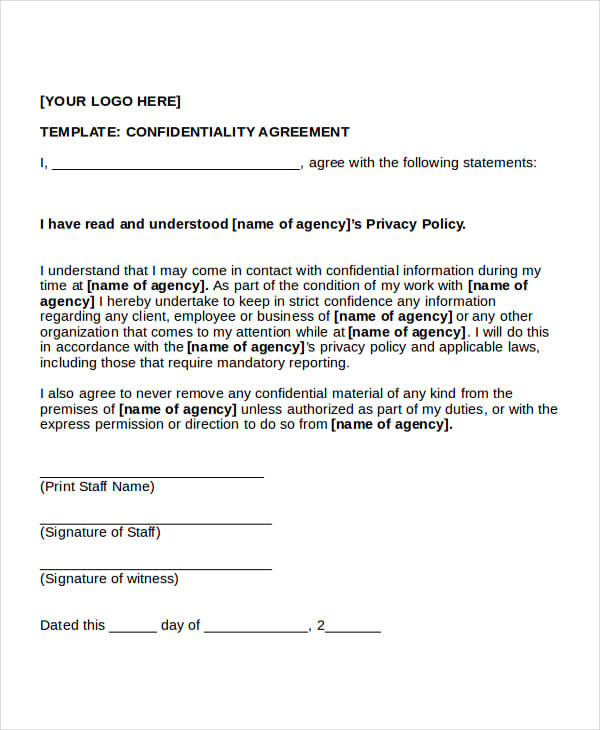
What is mutual non disclosure agreement? You will agree not to disclose any confidential information obtained during negotiations , and the other side will agree as well. Entrepreneur magazine says that companies need a non-disclosure agreement when they bring on a new investor or business partner. Additionally, people need an NDA if they consider selling the company. But when should NDAs be used , and what types of information should.

A Non-Disclosure Agreement is also known as a confidentiality agreement or an NDA. In principle, a Non-Disclosure Agreement is able to protect any kind of information. It’s always wise to limit how much important information you share with another until you know that you can trust them and you’re surethat you want to take the business relationship deeper. You may be worried that if you share your secrets with another party, they may misuse the information for their own purposes or share it around recklessly. Rather than ignoring your fears or halting your discussions, especially if there’s a high possibility that you’ll want to work together, protect your confidential information with an NDA.
Confidential information can include things such as customer lists, technical designs and your business plan. See full list on everynda. As freelancers are not attached to you under a permanent contract, you may want to be careful what you share with the freelancer. An NDA is not requiredif you don’t intend to share any confidential information with the freelancer.

However, you may be hiring a marketing expert to help you grow your business and you need to provide them with your current customer lists. Alternatively, you may be considering hiring a developer to help you develop something technical such as mobile software where you need to share information such as source codes and business strategies. Another good time to ask someone to sign an NDA is when you’re hiring the freelancer to help you develop something new that has intellectual property (IP) rightstied to it. In this case, you want to ensure that the IP rights transfer to you properly and you can combine “work for hire” clauses along with non-disclosure clauses in the agreement you’ll sign with the freelancer.
It’s not unusual for startups and other companies in the tech industry to require their employees to sign an NDA before they begin employment. Normally, the clauses to bound the employee to confidentiality obligations are included along with the employment contract. Most employees don’t object to these clauses as most employees accept that there’s an ethical obligation to protect the secrets of the employer that they work for.
Because of this, you should consider requesting an NDA beforethese negotiations begin. An example of a case where non - disclosure agreements turned out to be essential for the party revealing confidential information is the case of Convolve, Inc. And Massachusetts Institute of Technology v. Compaq Computer Corporation and Seagate Technology, LLC. Although the aggrieved party Convolvedid not prevail due to its failure to comply with the non - disclosure agreement , the case does demonstrate the dangers of sharing confidential information with potential licensees that could later become competitors. Most of them (especially those who invest in startups as a full-time job or sit on several boards) refuse to sign this agreementas they are inundated with requests for pitches every day.
However, this doesn’t mean that you should never ask to get this type of agreement drafted and signed when it comes to potential investors. Although it’s not a good idea to ask an investor to sign the agreement before your pitch, they are normally more agreeable with signing one when they’re serious about investing in you. The law is clear: if you want to keep your trade secret status, you need to take reasonable stepsto protect the confidentiality of your trade secret. Apart from trade secrets, you should also require NDAs if you are intending to apply for a patent for your invention later on. NDAs are a MUST if you intend to share trade secrets.
This type of agreement can be used to supplement intellectual property rights. When you’re getting the other party to sign other agreements it might be good time to ask for an NDA as well. A manufacturing agreement 2. An investment agreement 3. A corporate governance document 4. A technology licensing agreement In this type of situation, both parties have already decided to form a formal relationship with each other for a perceived benefit. The additional agreement to protect confidential information will probably also be a good supplement to the existing agreement.
Decisions such as considering the sale of your business, merging with another business or acquiring another business tend to shake the stability of a business, including a business’ clients and employees. But in the event that negotiations break down and no agreement of a sale, merger or acquisition is reache there’s no need to destabilize the business. While negotiations are underway and nothing is confirme NDAs can be used to maintain privacy between the parties involved in the negotiation. NDAs should be used in additionto security measures you take to protect your confidential information. Remember that these legal agreements provide you with legal recoursein case of a breach, but most legal actions are costly and take time.
If you have many employees working for you, consider implementing an information security policy if you don’t already have one. Training should be provided to employees to help them identify what confidential information is and how it should be treated and stored. Before you share any confidential information that you cannot afford to be exposed or misuse you should ask for an NDA. In general, it’s better to be safe than sorry. For example, Sabeer Bhatia, the founder of Hotmail, took confidentiality very seriously.
Except as provided in paragraph (b) of this subsection, technical data or computer software delivered to the Government with restrictions on use, modification, reproduction, release, performance, display, or disclosure may not be provided to third parties unless the intended recipient completes and signs the use and non-disclosure agreement at paragraph (c) of this subsection prior to release, or disclosure of the data. Use and non-disclosure agreement. In its most basic form, a nondisclosure agreement is a legally enforceable contract that creates a confidential relationship between a person who holds some kind of trade secret and a person to whom the secret will be disclosed.
A non-use agreement is normally found between parties that are trying to restrict the use of information that’s disclosed without authorization. Confidentiality agreements typically serve three key functions: NDAs protect sensitive information. Examples where non-use agreements are particularly useful is when you intend to share intellectual property with another party but you want to ensure that you retain all rights to the information. Non-use agreements can be very useful but they are generally not as commonly used as the non-disclosure agreements. An NDA (a non-disclosure agreement)is also known as a confidentiality or trade secret agreement but essentially, it’s a legally binding contract between parties that requires them to keep certain information confidential and not to misuse that confidential information.
So, how is a non-use agreement different from a non-disclosure agreement? Actually these agreements are essentially the samebecause non-use agreements are normally combined with NDA agreements anyway. Generally, an NDA encompasses the provisions (clauses) of a non-use agreement but also prohibits disclosure or sharing of that information with non-authorized parties and vice versa. NDA agreements can be used to protect a wide range of confidential information including trade secrets.
Startups, individuals, small and medium-sized enterprises (SMEs) and larger corporations love to use these kind of agreements when trying to establish a new business relationship, partnership or employment relationship with another party. In the event of a breach of confidentiality, NDAs can provide for both monetary remedies as well as injunctive and equitable relief to stop any further breaches from occurring. These kind of agreements can go both ways or be only one-way.
A mutual NDA is where both parties are making disclosures that need to be kept confidenti. Register and Subscribe now to work with legal documents online. Instant Downloa Mail Paper Copy or Hard Copy Delivery, Start and Order Now! When to use a non-disclosure agreement. When people have great ideas for a new product or business, one of the first questions they ask is: “When should I use a non-disclosure agreement ? Let’s start by clarifying what a non-disclosure agreement (NDA) is.
An NDA is a legally enforceable contract that includes a promise not to divulge secrets. It’s also an effective way to inform the other party that you prioritize confidentiality in your dealings. However, there are times when it’s not appropriate to ask for and use an NDA. An NDA is typically put to use any time that confidential information is disclosed to potential investors, creditors, clients, or suppliers.
Pros and cons of a non-disclosure agreement. Understanding the benefits and limitations of a non-disclosure agreement is important. A deeper knowledge of the agreement will help you know the risks involved in using the non-disclosure agreement.
Sometimes, inventors use a non-disclosure agreement as a replacement for a patent application. During the Term of this Agreement and for five (5) years as from its termination for whatsoever reason, the receiving party shall (i) treat Confidential Information provided by the disclosing party under this Agreement and all previous agreements as it would treat its own information of a similar nature, (ii) take all reasonable precautions not to disclose such. If you need assistance with an IP-related NDA, the Law Office of Michael O’Brien can help.
An NDA works by offering documentation that confidential information was disclosed to an individual with the expectation that the information would not be shared with anyone who is not. Non-disclosure agreements , confidential information, and trade secrets Start-ups often begin with a simple idea. You might think of an innovative solution to a problem or recognise a gap in the market that others haven’t noticed.
Instantly Find and Download Legal Forms Drafted by Attorneys for Your State.

No comments:
Post a Comment
Note: Only a member of this blog may post a comment.